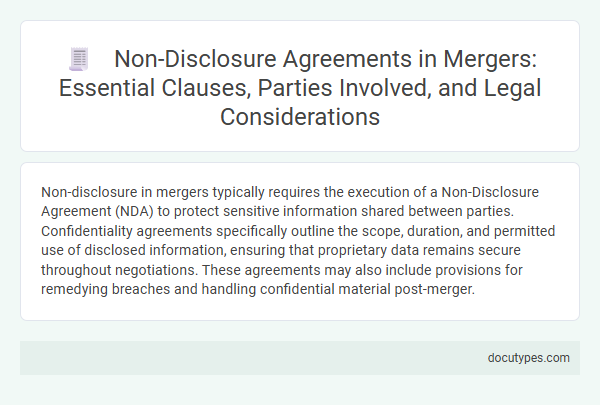Non-disclosure in mergers typically requires the execution of a Non-Disclosure Agreement (NDA) to protect sensitive information shared between parties. Confidentiality agreements specifically outline the scope, duration, and permitted use of disclosed information, ensuring that proprietary data remains secure throughout negotiations. These agreements may also include provisions for remedying breaches and handling confidential material post-merger.
Introduction to Non-Disclosure Agreements in Mergers
Non-Disclosure Agreements (NDAs) play a crucial role in mergers by safeguarding confidential information exchanged between parties. These agreements establish clear terms on what information must be kept confidential throughout the negotiation and due diligence processes. Your commitment to an NDA ensures trust and legal protection during the sensitive stages of a merger.
Importance of NDAs in Mergers and Acquisitions
Non-disclosure agreements (NDAs) are crucial in mergers and acquisitions to safeguard sensitive information exchanged between parties. These agreements help maintain confidentiality, ensuring that proprietary data and strategic plans remain secure during negotiations.
- Mutual NDA - Protects confidential information shared between both parties, ensuring reciprocal obligations of secrecy.
- Unilateral NDA - Imposes confidentiality obligations on one party, typically the recipient of sensitive information.
- Standstill Agreement - Prevents one party from taking certain competitive actions or acquiring additional shares during negotiations.
NDAs establish trust and legal protection, enabling smooth information flow essential for successful mergers and acquisitions.
Key Parties to a Merger NDA
Non-disclosure agreements (NDAs) are essential in mergers to protect sensitive information. Identifying key parties to the NDA ensures all stakeholders maintain confidentiality during negotiations.
- Buyer - The party interested in acquiring the company, responsible for handling confidential data with care.
- Seller - The company or individual offering business assets, ensuring proprietary information remains protected.
- Advisors and Consultants - Legal, financial, and other experts involved in the merger, bound by the NDA to maintain confidentiality.
Essential Clauses in Merger NDAs
In mergers, Non-Disclosure Agreements (NDAs) are crucial to protect sensitive information shared between parties. These agreements prevent unauthorized disclosure and maintain confidentiality throughout the negotiation process.
Essential clauses in merger NDAs include definitions of confidential information, obligations of receiving parties, and permitted disclosures. You must also ensure the agreement specifies the duration of confidentiality and remedies for breach to safeguard your interests effectively.
Definition of Confidential Information
What types of agreements are required for non-disclosure in mergers? Non-disclosure agreements (NDAs) are essential to protect sensitive information during mergers. These agreements define the scope and limits of confidential information shared between parties.
What is the definition of confidential information in merger agreements? Confidential information typically includes business plans, financial data, intellectual property, and proprietary processes. Clear definitions help ensure all parties understand what information must remain protected.
Duration and Scope of Confidentiality
Non-disclosure agreements (NDAs) are essential in mergers to protect sensitive information shared between parties. These agreements define the duration and scope of confidentiality to ensure information is legally safeguarded throughout the process.
- Mutual NDA - This agreement requires both parties to keep disclosed information confidential for a specified period, often lasting from one to five years post-merger.
- Uni-directional NDA - Only one party discloses confidential information while the recipient is bound to confidentiality, usually with a defined time frame and limited scope.
- Scope of Confidentiality - Agreements detail what information is protected, typically including financial data, proprietary technology, and strategic plans relevant to the merger.
Exclusions and Limitations to Disclosure
Non-disclosure agreements (NDAs) in mergers are essential to protect sensitive information during negotiations. These agreements typically include specific clauses outlining exclusions and limitations to disclosure.
Exclusions often cover information already public or independently developed, ensuring your obligations are clear. Limitations restrict the use and sharing of confidential data strictly to merger-related purposes, minimizing risks of unauthorized disclosure.
Legal Obligations and Consequences of Breach
In mergers, non-disclosure agreements (NDAs) are essential to protect sensitive information exchanged during negotiations. These agreements legally bind parties to confidentiality obligations, preventing unauthorized disclosure of proprietary data. Breach of NDAs can result in severe legal consequences, including injunctive relief, monetary damages, and potential termination of the merger process.
Governing Law and Jurisdiction in Merger NDAs
In mergers, Non-Disclosure Agreements (NDAs) often include provisions specifying the governing law and jurisdiction to ensure legal clarity and enforceability. These clauses determine which state's or country's laws will apply and where disputes will be resolved, protecting sensitive merger information.
Governing law in merger NDAs defines the legal framework that will interpret the agreement, typically favoring jurisdictions with well-established corporate and contract laws. Jurisdiction clauses specify both the location and court system where any legal actions will take place, providing predictability in dispute resolution. You should carefully review these provisions to align them with your strategic and legal interests during the merger process.
What Types of Agreements Are Required for Non-Disclosure in Mergers? Infographic

